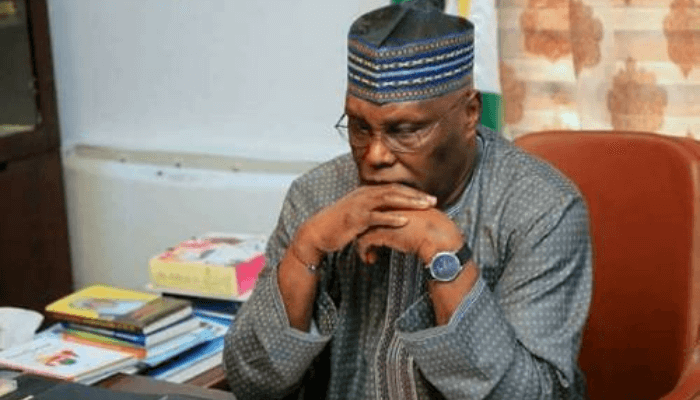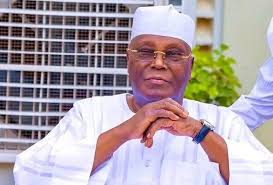Nigerians voice their struggles as they support Atiku’s claims on economic hardship

On Monday, October 7, former Vice President Atiku Abubakar criticized the government of President Bola Tinubu for worsening Nigeria’s economic troubles.
Atiku claimed that the current hardship in the country is a result of Tinubu’s rushed policies and lack of a clear plan when he assumed office. He also pointed out that the President’s government has failed to offer any real solutions for the country’s crisis.
Atiku’s comments came in response to the Presidency’s dismissal of his previous statements about what he would have done differently if he had won the 2023 election. On Sunday, October 6, Atiku had shared his vision for fixing the economy and criticized the government’s fuel subsidy removal and other economic measures.
Atiku strongly argued that the government could not tax its way out of the crisis. In his statement, he said, “What we would have done differently” and explained how his proposed policies, in contrast to the government’s, would focus on fostering economic growth without burdening Nigerians further.
The Presidency, through the Special Adviser to the President on Information and Strategy, Bayo Onanuga, dismissed Atiku’s ideas as lacking detail. Onanuga suggested that if Atiku had been President, he would have made the situation even worse or engaged in favoritism.
Atiku responded, saying, “Like many fellow Nigerians, I firmly believe that we find ourselves in this current economic turmoil due to the current administration’s hasty ascent to power, devoid of a coherent plan.”
He also took a jab at the government’s approach to the crisis, stating, “Is it not fascinating how the so-called tested Tinubu administration’s only policy response seems to be a national prayer led by the First Lady and the National Security Adviser, just a mere 24 hours after I proposed my alternative solutions? What a bold strategy!”
While he acknowledged the power of prayer, Atiku reminded the public that the scriptures also emphasize hard work and diligent effort. He pointed to examples of other countries, such as the United Arab Emirates and Monaco, which built strong economies through low taxes and sound policies. Atiku questioned why Tinubu’s government continued to implement policies that burdened Nigerians even more.
“We cannot hope to tax our way out of the economic quagmire wrought by these misguided experimental policies of a novice administration,” he said.
He also addressed the controversy surrounding the 2023 election, declaring, “Let me emphasise that the citizens who cast their votes in the 2023 presidential election are well aware that I did not lose; rather, we found ourselves in this predicament because the election was criminally stolen from the Nigerian people.”
Atiku pointed out that during his time in office, from 1999 to 2003, Nigeria’s economy performed much better than it has under President Tinubu. “The average GDP rate under the Obasanjo administration that I served in was 6.59 percent and peaked at 15 percent in 2002, compared to the dismal 2.8 percent under the so-called ‘tested’ Tinubu era,” he added.
In Katsina State, local educationist Mallam Sabiu Fago painted a bleak picture of the current situation, saying, “The cloud is gathering and becoming darker by the day. Danger lurks around as hunger and starvation bite harder.” He explained that many Nigerians are struggling to afford basic food items as prices have skyrocketed, with essential goods like maize, rice, and beans becoming unaffordable for most families.
Yusuf Shehu, a former lawmaker in Katsina, agreed with Atiku, saying that the government’s abrupt removal of the petrol subsidy without alternative solutions has caused suffering across the country. He questioned the logic of announcing the subsidy removal without a solid plan in place to address its impact on the people.
He said, “From the very moment when he made that announcement on May 29, 2023, till today, Nigerians have known no peace. It has been suffering all the way, and I don’t even see a sign of respite in the nearest future.”
Shehu also criticized the government for failing to reopen the Port Harcourt refinery, which was promised as part of the post-subsidy plan. He urged the government to address the growing discontent before it turns into something more dangerous.
In support of Atiku, Dr. Pogu Bitrus, President of the Middle Belt Forum, agreed that the economic policies under Tinubu’s administration—specifically the fuel subsidy removal and the floating of the Naira—are causing unnecessary hardship.
Abdullahi Fago, another educationist, urged the government to focus on providing good governance instead of dismissing citizens’ concerns. He warned that the situation could escalate into a far more serious crisis if the government does not act quickly.
Lagos-based lawyer Marcellus Onah also condemned the Presidency’s dismissal of Atiku’s remarks. He emphasized, “Atiku was just speaking the minds of Nigerians. Who doesn’t know that the current hardship was caused by the fuel subsidy removal and the floating of Naira?”
Many Nigerians, including these voices from different parts of the country, continue to express frustration with the government’s economic policies and warn of the consequences if urgent action is not taken to alleviate the suffering.





